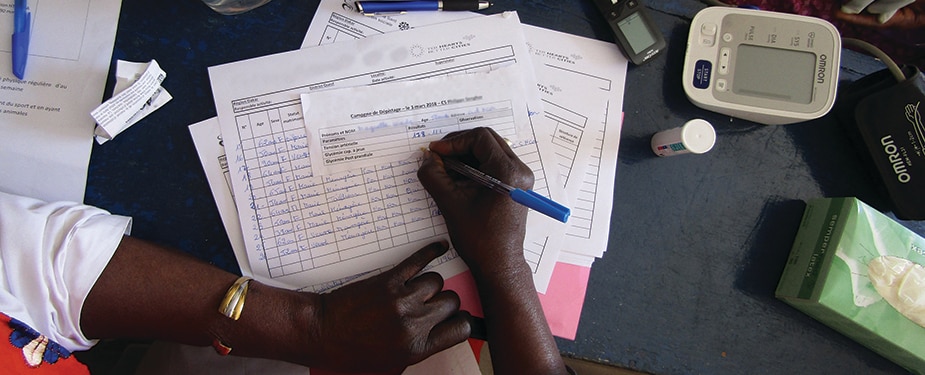How Senegal is Tracking the Silent Killer
September 6, 2018

A health worker completes patient paperwork at a clinic. Photo: Cheick Niang.
At a packed clinic in the middle of Dakar, Senegal, a busy nurse secures a blood pressure cuff around a patient’s arm. “After I take the blood pressure, I record it here,” the nurse says enthusiastically, showing a patient treatment card to Dr. Monica LaBelle, a CDC Foundation Evaluation Scientist. Dr. LaBelle is in Dakar as part of the Better Hearts Better Cities initiative, which aims to address cardiovascular health in low-income urban settings across the globe. The patient information card is one component of an enhanced system for monitoring rates of high blood pressure (hypertension) in thirteen health facilities across Dakar.
A SILENT KILLER
Like many low- and middle-income countries (LMICs), Senegal is facing staggering rates of untreated hypertension. Although nearly 30% of the Senegalese population is estimated to be afflicted with hypertension, the control rate in Senegal is just 8% (compared to 53% in the United States).
THE HEART OF THE MATTER

A health worker screens a resident for hypertension. Photo: Cheick Niang.
CDC and other partners have teamed up with the World Health Organization (WHO) to launch the Global Hearts Initiative. Under the Initiative, CDC and WHO developed high-impact, evidence-based interventions, including six practical modules to help strengthen cardiovascular disease management in primary care. These modules, known as the HEARTS technical package, are being implemented globally.
In alignment with the HEARTS technical package, Better Hearts Better Cities seeks to improve the prevention, management, and care of high blood pressure, as well as tackle key changeable risk factors through multi-sector partnerships. The initiative is led by the Novartis Foundation in partnership with CDC, CDC Foundation, and other global experts. In addition to Dakar, Better Hearts Better Cities is being implemented in Ulaanbaatar, Mongolia, and São Paulo, Brazil.
LEADING THE WAY IN DAKAR
Inside a meeting room in Dakar, Dr. LaBelle and local colleagues passionately discuss how they will integrate monitoring and evaluation strategies into the program. As the global evaluation partner, CDC is working alongside local partners to provide technical expertise, continuous feedback, and sound measurement for the Better Hearts Better Cities program.
“We’re working together to create feasible solutions that add value for clinic staff,” remarks Dr. LaBelle. Local partners have trained more than 80 doctors and health workers to screen, refer, and treat patients according to standard protocols.